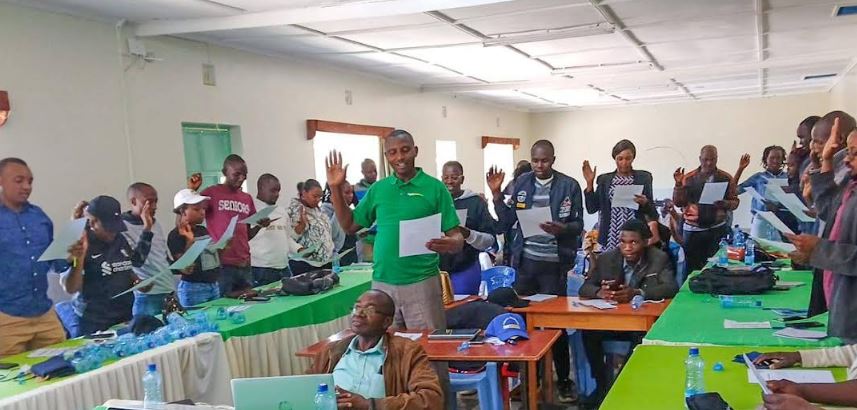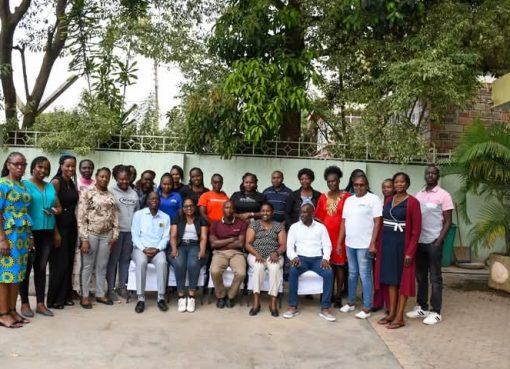The County Government of Nakuru has come up with a strategy to make farming appealing to the youth.
According to County Executive for Agriculture, Livestock and Fisheries Leonard Bor, the devolved unit has trained 350 agri-preneurs as part of a programme to ensure more youth take up farming as an income-generating venture to improve food nutrition and security.
Bor indicated that the agri-preneurs had been retooled to empower smallholder farmers across the 11 sub-counties into the formal economy and link them with other actors in the agricultural value chain to bring about a movement on a mass scale.
Speaking in Nakuru when he graced the training of over 200 agri-preneurs drawn from Molo, Kuresoi North, and Kuresoi South Subcounties, the county executive stated that the trainees had been taught to incorporate technology, new ideas, innovative approaches, basic education and technical capacity building to demonstrate practical ways to grow more produce, create processing capacity and impact market share on a grand scale.
“They have acquired skills that will help them guide farmers on best agricultural practices, pest management, and irrigation techniques. Agripreneurs are young people who start, organizes and manage a business venture focusing on the agricultural sector,” explained Bor.
The agri-preneurs will be engaged for the next 18 months, working through the National Agricultural Value Chain Development Project (NAVCDP).
He stated that the agri-preneurs will be tasked with connecting farmers across all the 11 sub-counties with suppliers for quality inputs and linking them to markets to secure fair prices, as well as assisting farmers in accessing financial services, supporting loan applications, and connecting them with providers of farm and mechanisation services.
“Additionally, the agri-preneurs will regularly track progress, provide feedback for improvement, and maintain accurate records to inform decision-making and planning in the agricultural sector in the county,” observed Mr. Bor.
While noting that the agri-preneurs are critical to the economic empowerment of smallholder farmers as they will be the champions of agricultural reforms under the Bottom-up Economic Transformation Agenda (BETA), Bor noted that they will also contribute to the county’s initiatives in agriculture on food security, income generation, and wealth creation.
The agripreneurs will work hand in hand with extension officers in every sub-county to educate farmers on agribusiness and ensure Kenya achieves food security.
This, Bor said, will boost revenue collected in agriculture as well as improve the lives of farmers in the country.
The county executive explained that their work would also involve registration and profiling farming households as well as non-household farms, including large, commercial, institutional, greenhouse, and ranch operations.
“The other tasks of the agri-preneurs would be profiling the various value chain actors, mapping and taking the Global Positioning System (GPS) of the agricultural farms in their wards, as well as offering training and extension services to the farmers,” he said.
The county executive stated that the recruitment of the agri-preneurs is a great milestone in transforming the county’s agricultural sector from subsistence to commercial.
He pointed out that in response to the adverse effects of climate change on agricultural activities, farmers need to practice climate-smart agriculture and reduce dependence on rain-fed farming for assured sustainability and good yields.
Bor indicated that the trainees had been equipped with the necessary digital tools to enable them to perform their roles effectively. Registration of farmers on a digital platform, he added, will enable the agri-preneurs to provide farmer-specific interventions.
The agri-prenuers will not be national or county employees but will rather be entrepreneurs who can tap opportunities that include the sale of inputs, aggregation services, value addition, veterinary services, as well as breeding and brooding.
The agri-preneurs he added will perform diverse roles, including acting as a link between farmers and the market.
They will also provide services such as financial literacy and climate-smart advisory services, as well as ways to access mechanisation, farm inputs and credit services.
They will also be key players at the aggregation centres, as they will be required to provide mentorship and facilitate value addition among farmers.
The training programme focused on equipping the agricultural entrepreneurs with essential business skills like marketing, financial management, quality control, and technical knowledge related to their chosen farming practices, aiming to enhance their ability to run profitable and sustainable agricultural ventures within the Kenyan market.
They were also equipped with skills to develop comprehensive business plans that include market analysis, cost projections, and financial strategies, understanding market trends, customer needs, and effective marketing channels to reach consumers and sell agricultural products.
Bor pointed out that the trainees had acquired practical skills in efficient farming practices like crop rotation, pest management, and water conservation in addition to learning about financial management, record keeping, budgeting, and accessing loans to finance agricultural operations.
“They will also be better placed to ensure the quality and standards of agricultural produce to meet market requirements and integrate technology like precision farming and data analytics to improve productivity and decision-making,” noted Bor.
By Anne Mwale




